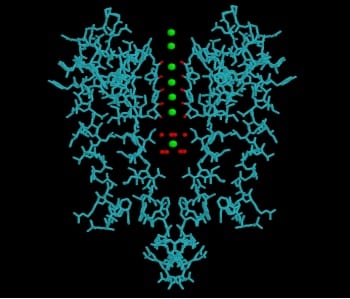 A potassium channel/David S. Goodsell,The Scripps Research Institute
A potassium channel/David S. Goodsell,The Scripps Research Institute
Ion channels are pore-forming proteins that poke through cell membranes to control the movement of ions like calcium, potassium, and chloride in and out of cells. Movement of these ions is critical for a wide-array of physiological processes — everything from controlling the heartbeat to flexing muscles to firing neurons.
Because ion channels are so essential, mutations in these proteins can lead to serious disease. For example, cystic fibrosis is caused by mutations in a chloride channel protein and certain forms of epilepsy are caused by mutations in sodium channel genes.
Three studies published online yesterday in the journal Nature Genetics show that common variants in ion channel genes may also contribute to disease risk. Two groups found evidence that a potassium channel protein is associated with type 2 diabetes, while another group discovered that a calcium channel and a protein that regulates sodium channels might be associated with bipolar disorder.
Type 2 Diabetes
Of all the conditions that have so far been studied with genome wide association study methods, type 2 diabetes has been one of the blockbusters. Research continues and variants associated with the condition are constantly being found and/or validated.
This week Yasuda et al contribute their finding that a variant associated with an increased risk for developing type 2 diabetes.
This variant is in the gene KCNQ1, which encodes part of a potassium channel that has known roles in cardiac muscle. It is not yet known how this gene could affect the risk for type 2 diabetes, but there is evidence that it is turned on in the pancreas. Yasuda et al found that people with who were homozygous for the variant had evidence of impaired insulin secretion. Another potassium channel gene, KCN11 has previously been associated with type 2 diabetes in several studies.
Genomewide association studies have struggled to find SNPs that are associated with diseases in more than one ethnic group. That’s why it is surprising that the variant was associated with type 2 diabetes not only in the original Japanese set of cases and controls used in this study, but also in Chinese, Korean, and European samples.
Bipolar Disorder
Bipolar disorder is a serious mental illness that affects about one to three percent of the world’s population. As with many other common diseases, researchers have been using genomewide association studies in an effort to find SNPs associated with bipolar disorder in order to begin to understand how and why this disease strikes and how best to treat it. So far, however, progress has been slow and there has been little agreement from study to study.
In their quest to tease out the genetics of bipolar disorder, Ferreira et al took an approach that is becoming more popular–they combined data from several smaller studies to get the larger sample size that is often needed to find variants with modest effect. In total, they looked at 10,596 people of European ancestry — 4,387 people with bipolar disorder and 6,209 controls.
Two variants stood out as candidates for bipolar disorder. Both were in genes related to ion channels.
The first variant in in the gene CACNA1C, which encodes a calcium channel. Previous studies had hinted that this gene might be associated with bipolar disorder. The second variant is in the gene ANK3. This gene encodes a protein that has been shown to regulate sodium channels.
Further evidence for the involvement of these SNPs in bipolar disorder comes from previous studies by these same researchers. In mice they found that lithium, the most effective drug for treating bipolar disorder, appears to decrease the amount of protein made by the ANK3 and CACNA1C genes.
“Finding statistically robust associations linked to two proteins that may be involved in regulating such ion channels — and that are also thought to be targets of drugs used clinically to treat bipolar disorder — is astonishing,” said Pamela Sklar, a lead author of the study, in a statement.